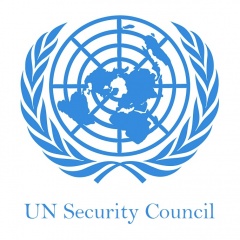Difference between revisions of "UN/SC/Resolution/2593"
m |
m |
||
| Line 7: | Line 7: | ||
}} | }} | ||
{{QB|The [[UN Security Council]] passed a resolution on Monday that calls for the [[Taliban]] to facilitate safe passage for people wanting to leave [[Afghanistan]], allow humanitarians to access the country, and uphold [[human rights]], including for women and children.<ref>''[https://news.un.org/en/story/2021/08/1098802 "Security Council urges Taliban to provide safe passage out of Afghanistan"]''</ref>}} | {{QB|The [[UN Security Council]] passed a resolution on Monday that calls for the [[Taliban]] to facilitate safe passage for people wanting to leave [[Afghanistan]], allow humanitarians to access the country, and uphold [[human rights]], including for women and children.<ref>''[https://news.un.org/en/story/2021/08/1098802 "Security Council urges Taliban to provide safe passage out of Afghanistan"]''</ref>}} | ||
| − | '''United Nations Security Council Resolution 2593''' was unanimously adopted on 30 August 2021, following the [[Afghanistan/2021 withdraw|"hasty and disorderly withdrawal of foreign troops"]] and [[Taliban]] takeover in [[Afghanistan]]. | + | '''United Nations Security Council Resolution 2593''' was drafted by three of the [[UNSC]] permanent members ([[US]], [[UK]] and [[France]]), and was unanimously adopted on 30 August 2021, following the [[Afghanistan/2021 withdraw|"hasty and disorderly withdrawal of foreign troops"]] and [[Taliban]] takeover in [[Afghanistan]]. |
| − | [[Russia]] and [[China]] abstained from voting on [[United Nations Security Council Resolution 2593]]. | + | The other two [[P5]] members, [[Russia]] and [[China]], abstained from voting on [[United Nations Security Council Resolution 2593]]. |
==Demands== | ==Demands== | ||
Revision as of 19:08, 1 September 2021
 | |
| Date | 30 August 2021 |
|---|---|
The UN Security Council passed a resolution on Monday that calls for the Taliban to facilitate safe passage for people wanting to leave Afghanistan, allow humanitarians to access the country, and uphold human rights, including for women and children.[1]
United Nations Security Council Resolution 2593 was drafted by three of the UNSC permanent members (US, UK and France), and was unanimously adopted on 30 August 2021, following the "hasty and disorderly withdrawal of foreign troops" and Taliban takeover in Afghanistan.
The other two P5 members, Russia and China, abstained from voting on United Nations Security Council Resolution 2593.
Demands
UN/SC/Resolution 2593 demands that Afghan territory not be used to threaten or attack any country, or to shelter or train terrorists, or to plan or finance terrorist acts.
It reiterates the importance of combating terrorism in Afghanistan and notes the Taliban's relevant commitments.
UNSCR 2593, which was adopted with 13 votes in favour and two abstentions, calls for strengthened efforts to provide humanitarian assistance to Afghanistan and calls on all parties to allow full, safe, and unhindered access for the United Nations, its specialised agencies and implementing partners, and all humanitarian actors engaged in humanitarian relief activity, to ensure that humanitarian assistance reaches all those in need.
UNSCR 2593 calls on all donors and international humanitarian actors to provide humanitarian assistance to Afghanistan and major Afghan refugee-hosting countries, and underlines that all parties must respect their obligations under international humanitarian law in all circumstances, including those related to the protection of civilians.[2]
Condemnation
UNSC members condemned in the strongest terms the deadly blasts at Kabul airport on Thursday, which killed more than 150 people and injured upwards of 200 more. The terrorist group Islamic State in Khorosan Province (ISKP) claimed responsibility.
The attack targeted people fleeing Afghanistan in the wake of the Taliban’s takeover two weeks ago, and international forces assisting the evacuations.
Thousands of Afghans have been trying to escape from the country ahead of the full withdrawal of the United States by its self-imposed Tuesday deadline.
Abstentions explained
Russia
In explaining his vote, Ambassador Vassily Nebenzia said Russia was forced to abstain because certain “principled concerns” were not reflected in the draft text, which was circulated on Friday:
“Firstly, despite the fact that the resolution was proposed against the backdrop of a terrible terrorist attack, the authors categorically refused to refer to a passage on the fight against terrorism containing internationally recognised terrorist organisations ISIL and the East Turkestan Islamic Movement,” he said, speaking through an interpreter. “We see this as a reluctance to acknowledge the obvious, and a desire to divide terrorists into ‘ours’ and ‘theirs’; and that is to say, to downplay the terrorist threat coming from these groups.”
China
Ambassador Geng Shuang of China stated that given the fragile situation on the ground, and the uncertainties, any UNSC action should help ease tensions, and not intensify them:
“The recent chaos in Afghanistan is directly related to the hasty and disorderly withdrawal of foreign troops,” he said. “We hope that relevant countries will realise the fact that withdrawal is not the end of responsibility, but the beginning of reflection and correction.”